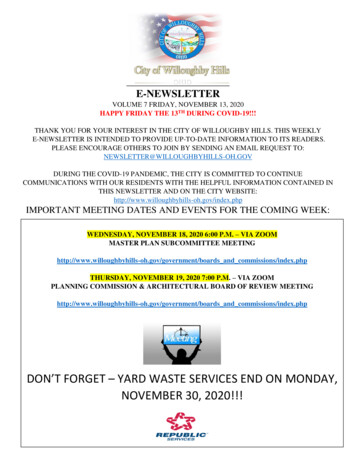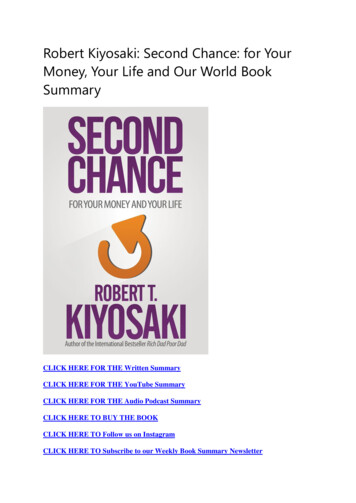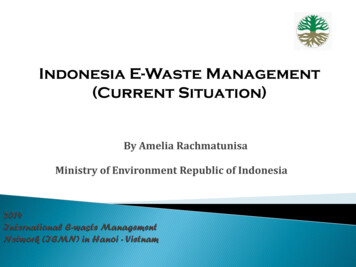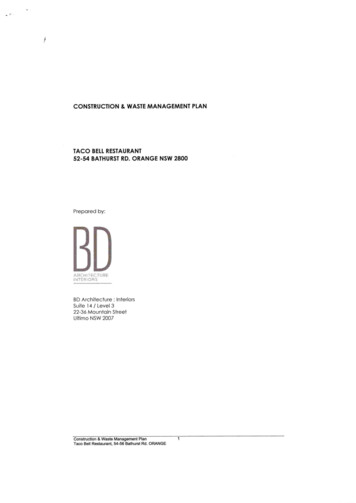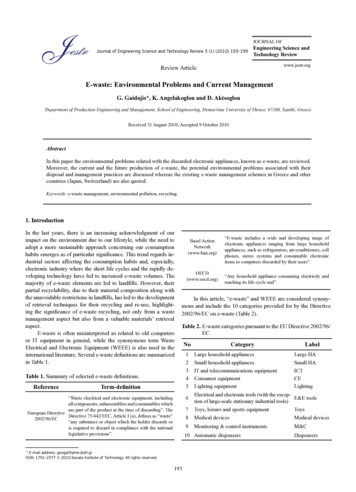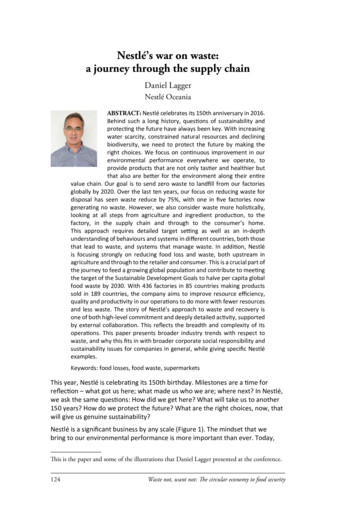
Transcription
DON’T WASTE YOUR LIFEDon'tWasteYrLifeGSE.06321.i02.indd 13/31/09 3:24 PM
B ooksbyJ ohn P iperGod’s Passion for His GloryThe Pleasures of GodDesiring GodThe Dangerous Duty of DelightFuture GraceA Hunger for GodLet the Nations Be Glad!A Godward LifePierced by the WordSeeing and Savoring Jesus ChristThe Legacy of Sovereign JoyThe Hidden Smile of GodThe Roots of EnduranceThe Misery of Job and the Mercy of GodThe InnkeeperThe Prodigal’s SisterRecovering Biblical Manhood and WomanhoodWhat’s the Difference?The Justification of GodCounted Righteous in ChristBrothers, We Are Not ProfessionalsThe Supremacy of God in PreachingBeyond the BoundsDon’t Waste Your LifeThe Passion of Jesus ChristLife as a VaporA God-Entranced Vision of All ThingsWhen I Don’t Desire GodSex and the Supremacy of ChristTaste and SeeFifty Reasons Why Jesus Came to DieGod Is the GospelContending for Our AllWhat Jesus Demands from the WorldDon'tWasteYrLifeGSE.06321.i02.indd 23/31/09 3:24 PM
CROSSWAY BOOKSWHEATON, ILLINOISDon'tWasteYrLifeGSE.06321.i02.indd 33/31/09 3:24 PM
Don’t Waste Your Life (Group Study Edition)Copyright 2007 by Desiring God FoundationPublished by Crossway Booksa publishing ministry of Good News Publishers1300 Crescent StreetWheaton, Illinois 60187This Group Study Edition is based on and is a companion toDon’t Waste Your Life by John Piper (Crossway Books, 2003).All rights reserved. No part of this publication may be reproduced, storedin a retrieval system or transmitted in any form by any means, electronic,mechanical, photocopy, recording or otherwise without the prior permission of the publisher, except as provided by USA copyright law.Italics in biblical quotes indicate emphasis added.Scripture quotations are taken from the ESV Bible (The Holy Bible,English Standard Version ). Copyright 2001 by Crossway Bibles,a publishing ministry of Good News Publishers. Used by permission.All rights reserved.Other Scripture quotations are from:The Holy Bible, New International Version (niv). 1973, 1978, 1984by International Bible Society. Used by permission of Zondervan Publishing House. All rights reserved.The Holy Bible, King James Version (kjv)Cover design: Matt TaylorCover photo: Getty ImagesFirst printing, redesign 2009Printed in the United States of AmericaISBN 13: 978-1-4335-0632-1ISBN 10: 1-4335-0632-7Library of Congress Cataloging-in-Publication DataPiper, John, 1946 Don’t waste your life / John Piper.p. cm.Includes bibliographical references.ISBN 13: 978-1-58134-498-1 (pbk. : alk. paper)ISBN 10: 1-58134-498-81. Christian life. I. TitleBV4501.3.P555 YrLifeGSE.06321.i02.indd 4136200300783312511410320913/31/09 3:24 PM
ToLouie Giglioand the passion of his heartfor the renown of Jesus Christin this generationDon'tWasteYrLifeGSE.06321.i02.indd 53/31/09 3:24 PM
Don'tWasteYrLifeGSE.06321.i02.indd 63/31/09 3:24 PM
CONTENTSPrefaceFor Christians and Non-Christians91 My Search for a Single Passion to Live By112 Breakthrough—the Beauty of Christ, My Joy233 Boasting Only in the Cross, The Blazing Centerof the Glory of God434 Magnifying Christ Through Pain and Death615 Risk Is Right—Better to Lose Your LifeThan to Waste It796 The Goal of Life—Gladly Making OthersGlad in God997 Living to Prove He Is More Precious Than Life1078 Making Much of Christ from 8 to 51319 The Majesty of Christ in Missions and Mercy—A Plea to This Generation15510 My Prayer—Let None Say in the End,“I’ve Wasted It”183Desiring God Ministries191Don'tWasteYrLifeGSE.06321.i02.indd 73/31/09 3:24 PM
Don'tWasteYrLifeGSE.06321.i02.indd 83/31/09 3:24 PM
PREFACEFor Christians and Non-ChristiansThe Bible says, “You are not your own, for you were boughtwith a price. So glorify God in your body” (1 Corinthians 6:1920). I have written this book to help you taste those words assweet instead of bitter or boring.You are in one of two groups: Either you are a Christian, orGod is now calling you to be one. You would not have pickedup this book if God were not at work in your life.If you are a Christian, you are not your own. Christ hasbought you at the price of his own death. You now belongdoubly to God: He made you, and he bought you. That meansyour life is not your own. It is God’s. Therefore, the Bible says,“Glorify God in your body.” God made you for this. He boughtyou for this. This is the meaning of your life.If you are not yet a Christian, that is what Jesus Christ offers:doubly belonging to God, and being able to do what you weremade for. That may not sound exciting. Glorifying God maymean nothing to you. That’s why I tell my story in the first twochapters, called “Created for Joy.” It was not always plain to methat pursuing God’s glory would be virtually the same as purs9Don'tWasteYrLifeGSE.06321.i02.indd 93/31/09 3:24 PM
PREFACEing my joy. Now I see that millions of people waste their livesbecause they think these paths are two and not one.There is a warning. The path of God-exalting joy will costyou your life. Jesus said, “Whoever loses his life for my sake andthe gospel’s will save it.” In other words, it is better to lose yourlife than to waste it. If you live gladly to make others glad inGod, your life will be hard, your risks will be high, and your joywill be full. This is not a book about how to avoid a woundedlife, but how to avoid a wasted life. Some of you will die in theservice of Christ. That will not be a tragedy. Treasuring lifeabove Christ is a tragedy.Please know that I am praying for you, whether you are a student dreaming something radical for your life, or whether youare retired and hoping not to waste the final years. If you wonderwhat I am praying, read Chapter 10. That is my prayer.For now, I thank God for you. My joy grows with everysoul that seeks the glory of God in the face of Jesus Christ.Remember, you have one life. That’s all. You were made forGod. Don’t waste it.March 31, 2003John Piper10Don'tWasteYrLifeGSE.06321.i02.indd 103/31/09 3:24 PM
1RETPAHCPASSIONA SINGLEROFHCRMY SEAYTO LIVE BMy father was an evangelist. In fact he still is, even thoughhe doesn’t travel now. When I was a boy, there were rare occasions when my mother and sister and I traveled with him andheard him preach. I trembled to hear my father preach. In spiteof the predictable opening humor, the whole thing struck me asabsolutely blood-earnest. There was a certain squint to his eyeand a tightening of his lips when the avalanche of biblical textscame to a climax in application.“I’VE WASTED IT, I’VE WASTED IT”Oh, how he would plead! Children, teenagers, young singles,young married people, the middle-aged, old people—he wouldpress the warnings and the wooings of Christ into the heartof each person. He had stories, so many stories, for each agegroup—stories of glorious conversions, and stories of horrificrefusals to believe followed by tragic deaths. Seldom could thosestories come without tears.For me as a boy, one of the most gripping illustrations my11Don'tWasteYrLifeGSE.06321.i02.indd 113/31/09 3:24 PM
DON’T WASTE YOUR LIFEfiery father used was the story of a man converted in old age. Thechurch had prayed for this man for decades. He was hard andresistant. But this time, for some reason, he showed up when myfather was preaching. At the end of the service, during a hymn, toeveryone’s amazement he came and took my father’s hand. Theysat down together on the front pew of the church as the peoplewere dismissed. God opened his heart to the Gospel of Christ, andhe was saved from his sins and given eternal life. But that did notstop him from sobbing and saying, as the tears ran down his wrinkled face—and what an impact it made on me to hear my fathersay this through his own tears—“I’ve wasted it! I’ve wasted it!”This was the story that gripped me more than all the storiesof young people who died in car wrecks before they were converted—the story of an old man weeping that he had wasted hislife. In those early years God awakened in me a fear and a passion not to waste my life. The thought of coming to my old ageand saying through tears, “I’ve wasted it! I’ve wasted it!” was afearful and horrible thought to me.“ONLY ONE LIFE, ’TWILL SOON BE PAST”Another riveting force in my young life—small at first, but oh sopowerful over time—was a plaque that hung in our kitchen overthe sink. We moved into that house when I was six. So I supposeI looked at the words on that plaque almost every day for twelveyears, till I went away to college at age eighteen. It was a simplepiece of glass painted black on the back with a gray link chainsnug around it for a border and for hanging. On the front, in oldEnglish script, painted in white, were the words:Only one life,’Twill soon be past;Only what’s donefor Christ will last.12Don'tWasteYrLifeGSE.06321.i02.indd 123/31/09 3:24 PM
MY SEARCH FOR A SINGLE PASSION TO LIVE BYTo the left, beside these words, was a painted green hill withtwo trees and a brown path that disappeared over the hill. Howmany times, as a little boy, and then as a teenager with pimplesand longings and anxieties, I looked at that brown path (mylife) and wondered what would be over that hill. The messagewas clear. You get one pass at life. That’s all. Only one. And thelasting measure of that life is Jesus Christ. I am fifty-seven as Iwrite, and that very plaque hangs today on the wall by our frontdoor. I see it every time I leave home.What would it mean to waste my life? That was a burningquestion. Or, more positively, what would it mean to live well—not to waste life, but to . . . ? How to finish that sentence was thequestion. I was not even sure how to put the question into words,let alone what the answer might be. What was the opposite ofnot wasting my life? “To be successful in a career”? Or “to bemaximally happy”? Or “to accomplish something great?” Or “tofind the deepest meaning and significance”? Or “to help as manypeople as possible”? Or “to serve Christ to the full”? Or “to glorify God in all I do”? Or was there a point, a purpose, a focus, anessence to life that would fulfill every one of those dreams?“THE LOST YEARS”I had forgotten how weighty this question was for me until Ilooked through my files from those early years. Just when I wasabout to leave my South Carolina home in 1964, never to returnas a resident, Wade Hampton High School published a simpleliterary magazine of poems and stories. Near the back, with thebyline Johnny Piper, was a poem. I will spare you. It was not agood poem. Jane, the editor, was merciful. What matters to menow was the title and first four lines. It was called “The LostYears.” Beside it was a sketch of an old man in a rocking chair.The poem began:13Don'tWasteYrLifeGSE.06321.i02.indd 133/31/09 3:24 PM
DON’T WASTE YOUR LIFELong I sought for the earth’s hidden meaning;Long as a youth was my search in vain.Now as I approach my last years waning,My search I must begin again.Across the forty years that separate me from that poem I canhear the fearful refrain, “I’ve wasted it! I’ve wasted it!” Somehowthere had been wakened in me a passion for the essence and themain point of life. The ethical question “whether something ispermissible” faded in relation to the question, “what is the mainthing, the essential thing?” The thought of building a life aroundminimal morality or minimal significance—a life defined by thequestion, “What is permissible?”—felt almost disgusting to me.I didn’t want a minimal life. I didn’t want to live on the outskirtsof reality. I wanted to understand the main thing about life andpursue it.EXISTENTIALISM WAS THE AIR WE BREATHEDThe passion not to miss the essence of life, not to waste it,intensified in college—the tumultuous late sixties. There werestrong reasons for this, reasons that go well beyond the innerturmoil of one boy coming of age. “Essence” was under assaultalmost everywhere. Existentialism was the air we breathed.And the meaning of existentialism was that “existence precedesessence.” That is, first you exist and then, by existing, you create your essence. You make your essence by freely choosing tobe what you will be. There is no essence outside you to pursueor conform to. Call it “God” or “Meaning” or “Purpose”—it isnot there until you create it by your own courageous existence.(If you furrow your brow and think, “This sounds strangelylike our own day and what we call postmodernism,” don’t besurprised. There is nothing new under the sun. There are onlyendless repackagings.)14Don'tWasteYrLifeGSE.06321.i02.indd 143/31/09 3:24 PM
MY SEARCH FOR A SINGLE PASSION TO LIVE BYI recall sitting in a darkened theater watching the theatricaloffspring of existentialism, the “theater of the absurd.” The playwas Samuel Beckett’s Waiting for Godot. Vladimir and Estragonmeet under a tree and converse as they wait for Godot. He nevercomes. Near the end of the play a boy tells them Godot willnot be coming. They decide to leave but never move. They gonowhere. The curtain falls, and God[ot] never comes.That was Beckett’s view of people like me—waiting, seeking,hoping to find the Essence of things, instead of creating my ownessence with my free and unbridled existence. Nowhere—that’swhere you’re going, he implied, if you pursue some transcendentPoint or Purpose or Focus or Essence.“THE NOWHERE MAN”The Beatles released their album Rubber Soul in December 1965and sang out their existentialism with compelling power for mygeneration. Perhaps it was clearest in John Lennon’s “NowhereMan.”He’s a real nowhere manSitting in his nowhere landMaking all his nowhere plansFor nobodyDoesn’t have a point of viewKnows not where he’s going toIsn’t he a bit like you and me?These were heady days, especially for college students. And,thankfully, God was not silent. Not everybody gave way to thelure of the absurd and the enticement of heroic emptiness. Noteveryone caved in to the summons of Albert Camus and JeanPaul Sartre. Even voices without root in the Truth knew thatthere must be something more—something outside ourselves,15Don'tWasteYrLifeGSE.06321.i02.indd 153/31/09 3:24 PM
DON’T WASTE YOUR LIFEsomething bigger and greater and more worth living for thanwhat we saw in the mirror.THE ANSWER, THE ANSWER WAS BLOWIN’IN THE WINDBob Dylan was scratching out songs with oblique messages ofhope that exploded on the scene precisely because they hinted ata Reality that would not keep us waiting forever. Things wouldchange. Sooner or later the slow would be fast and the firstwould be last. And it would not be because we were existentialmasters of our absurd fate. It would come to us. That is what weall felt in the song, “The Times They Are A-Changin’.”The line it is drawn,The curse it is cast,The slow one nowWill later be fast.As the present nowWill later be past,The order isRapidly fadin’.And the first one nowWill later be last,For the times they are a-changin’.It must have riled the existentialists to hear Dylan, perhapswithout even knowing it, sweep away their everything-goes relativism with the audacious double “The answer . . . The answer”in the smash hit, “Blowin’ in the Wind.”How many times must a man look upBefore he can see the sky?Yes, ’n’ how many ears mustone man have16Don'tWasteYrLifeGSE.06321.i02.indd 163/31/09 3:24 PM
MY SEARCH FOR A SINGLE PASSION TO LIVE BYBefore he can hear people cry?Yes, ’n’ how many deaths will it taketill he knowsThat too many people have died?The answer, my friend,is blowin’ in the wind,The answer is blowin’ in the wind.How many times can a man look up and not see the sky?There is a sky up there to be seen. You may look up ten thousandtimes and say you don’t see it. But that has absolutely no effecton its objective existence. It is there. And one day you will seeit. How many times must you look up before you see it? Thereis an answer. The answer, The answer, my friend, is not yoursto invent or create. It will be decided for you. It is outside you.It is real and objective and firm. One day you will hear it. Youdon’t create it. You don’t define it. It comes to you, and sooneror later you conform to it—or bow to it.That is what I heard in Dylan’s song, and everything in mesaid, Yes! There is an Answer with a capital A. To miss it wouldmean a wasted life. To find it would mean having a unifyingAnswer to all my questions.The little brown path over the green hill on our kitchenplaque was winding its way—all through the sixties—among thesweet snares of intellectual folly. Oh, how courageous my generation seemed when they stepped off the path and put their footin the trap! Some could even muster the moxie to boast, “I havechosen the way of freedom. I have created my own existence. Ihave shaken loose the old laws. Look how my leg is severed!”THE MAN WITH LONG HAIR AND KNICKERSBut God was graciously posting compelling warnings alongthe way. In the fall of 1965 Francis Schaeffer delivered a week17Don'tWasteYrLifeGSE.06321.i02.indd 173/31/09 3:24 PM
DON’T WASTE YOUR LIFEof lectures at Wheaton College that in 1968 became the book,The God Who Is There.1 The title shows the stunning simplicityof the thesis. God is there. Not in here, defined and shaped bymy own desires. God is out there. Objective. Absolute Reality(which Schaeffer pronounced something like “Reawity”). Allthat looks like reality to us is dependent on God. There is creation and Creator, nothing more. And creation gets all its meaning and purpose from God.Here was an absolutely compelling road sign. Stay on theroad of objective truth. This will be the way to avoid wastingyour life. Stay on the road that your fiery evangelist father wason. Don’t forsake the plaque on your kitchen wall. Here wasweighty intellectual confirmation that life would be wastedin the grasslands of existentialism. Stay on the road. There isTruth. There is a Point and Purpose and Essence to it all. Keepsearching. You will find it.I suppose there is no point lamenting that one must spendhis college years learning the obvious—that there is Truth, thatthere is objective being and objective value. Like a fish goingto school to learn that there is water, or a bird that there is air,or a worm that there is dirt. But it seems that, for the last twohundred years or so, this has been the main point of good education. And its opposite is the essence of bad education. So I don’tlament the years I spent learning the obvious.THE MAN WHO TAUGHT ME TO SEEIndeed, I thank God for professors and writers who devotedtremendous creative energies to render credible the existence oftrees and water and souls and love and God. C. S. Lewis, whodied the same day as John F. Kennedy in 1963 and who taughtEnglish at Oxford, walked up over the horizon of my littlebrown path in 1964 with such blazing brightness that it is hardto overstate the impact he had on my life.18Don'tWasteYrLifeGSE.06321.i02.indd 183/31/09 3:24 PM
MY SEARCH FOR A SINGLE PASSION TO LIVE BYSomeone introduced me to Lewis my freshman year withthe book, Mere Christianity.2 For the next five or six years Iwas almost never without a Lewis book near at hand. I thinkthat without his influence I would not have lived my life with asmuch joy or usefulness as I have. There are reasons for this.He has made me wary of chronological snobbery. That is,he showed me that newness is no virtue and oldness is no vice.Truth and beauty and goodness are not determined by whenthey exist. Nothing is inferior for being old, and nothing is valuable for being modern. This has freed me from the tyranny ofnovelty and opened for me the wisdom of the ages. To this dayI get most of my soul-food from centuries ago. I thank God forLewis’s compelling demonstration of the obvious.He demonstrated for me and convinced me that rigorous,precise, penetrating logic is not opposed to deep, soul-stirringfeeling and vivid, lively—even playful—imagination. He was a“romantic rationalist.” He combined things that almost everybody today assumes are mutually exclusive: rationalism andpoetry, cool logic and warm feeling, disciplined prose and freeimagination. In shattering these old stereotypes, he freed me tothink hard and to write poetry, to argue for the resurrectionand compose hymns to Christ, to smash an argument and hug afriend, to demand a definition and use a metaphor.Lewis gave me an intense sense of the “realness” of things.The preciousness of this is hard to communicate. To wake upin the morning and be aware of the firmness of the mattress,the warmth of the sun’s rays, the sound of the clock ticking,the sheer being of things (“quiddity” as he calls it3). He helpedme become alive to life. He helped me see what is there in theworld—things that, if we didn’t have, we would pay a milliondollars to have, but having them, ignore. He made me more aliveto beauty. He put my soul on notice that there are daily wondersthat will waken worship if I open my eyes. He shook my dozing19Don'tWasteYrLifeGSE.06321.i02.indd 193/31/09 3:24 PM
DON’T WASTE YOUR LIFEsoul and threw the cold water of reality in my face, so that lifeand God and heaven and hell broke into my world with gloryand horror.He exposed the sophisticated intellectual opposition toobjective being and objective value for the naked folly that itwas. The philosophical king of my generation had no clotheson, and the writer of children’s books from Oxford had thecourage to say so.You can’t go on “seeing through” things forever. The wholepoint of seeing through something is to see somethingthrough it. It is good that the window should be transparent, because the street or garden beyond it is opaque. Howif you saw through the garden too? It is no use trying to “seethrough” first principles. If you see through everything, theneverything is transparent. But a wholly transparent world isan invisible world. To “see through” all things is the sameas not to see.4Oh, how much more could be said about the world as C. S.Lewis saw it and the way he spoke. He has his flaws, some ofthem serious. But I will never cease to thank God for this remarkable man who came onto my path at the perfect moment.A FIANCÉE IS A STUBBORNLY OBJECTIVE FACTThere was another force that solidified my unwavering beliefin the unbending existence of objective reality. Her name wasNoël Henry. I fell in love with her in the summer of 1966. Waytoo soon probably. But it has turned out okay; I still love her.Nothing sobers a wandering philosophical imagination like thethought of having a wife and children to support.We were married in December 1968. It is a good thing todo one’s thinking in relation to real people. From that moment20Don'tWasteYrLifeGSE.06321.i02.indd 203/31/09 3:24 PM
MY SEARCH FOR A SINGLE PASSION TO LIVE BYon, every thought has been a thought in relationship. Nothingis merely an idea, but an idea that bears on my wife, then later,on my five children. I thank God for the parable of Christ andthe church that I have been obliged to live these thirty-five years.There are lessons in life—the unwasted life—that I would probably never have learned without this relationship (just as thereare lessons in lifelong singleness that will probably be learnedno other way).I BLESS YOU, MONO, FOR MY LIFEIn the fall of 1966 God was closing in with an ever narrowingpath for my life. When he made his next decisive move, Noëlwondered where I had gone. The fall semester had started, and Idid not show up in classes or in chapel. Finally she found me, flaton my back with mononucleosis in the health center, where I layfor three weeks. The life plan that I was so sure of four monthsearlier unraveled in my fevered hands.In May I had felt a joyful confidence that my life would bemost useful as a medical doctor. I loved biology; I loved the ideaof healing people. I loved knowing, at last, what I was doing incollege. So I quickly took general chemistry in summer school soI could catch up and take organic chemistry that fall.Now with mono, I had missed three weeks of organic chemistry. There was no catching up. But even more important, HaroldJohn Ockenga, then pastor of Park Street Church in Boston, waspreaching in chapel each morning during the spiritual emphasisweek. I was listening on WETN, the college radio station. Neverhad I heard exposition of the Scriptures like this. Suddenly all theglorious objectivity of Reality centered for me on the Word ofGod. I lay there feeling as if I had awakened from a dream, andknew, now that I was awake, what I was to do.Noël came to visit, and I said, “What would you think if I didn’t pursue a medical career but instead went to seminary?”21Don'tWasteYrLifeGSE.06321.i02.indd 213/31/09 3:24 PM
DON’T WASTE YOUR LIFEAs with every other time I’ve asked that kind of question throughthe years, the answer was, “If that’s where God leads you, that’swhere I’ll go.” From that moment on I have never doubted thatmy calling in life is to be a minister of the Word of God.NOTES1234Schaeffer’s prophetic work remains incredibly relevant to our age.I’d encourage every one of my readers to read at least one work bySchaeffer. A good place to begin with the “best of the best” is TheFrancis A. Schaeffer Trilogy: The God Who Is There, Escape fromReason, and He Is There and He Is Not Silent (Wheaton, Ill.: CrosswayBooks, 1990).C. S. Lewis, Mere Christianity (New York: Macmillan, 1952).C. S. Lewis, Surprised by Joy (New York: Harcourt, Brace and World,1955), 199.C. S. Lewis, The Abolition of Man (New York: Macmillan, 1947), 91.22Don'tWasteYrLifeGSE.06321.i02.indd 223/31/09 3:24 PM
CHAPTER 2BREAKTJOYHRIST, MYCFOYTUTHE BEAHROUGH—In 1968 I had no idea what it would mean for me to be aminister of the Word. Being a pastor was as far from my expectations as being a pastor’s wife was from Noël’s. What then?Would it mean being a teacher, a missionary, a writer, maybe aprofessor of literature with good theology? All I knew was thatultimate Reality had suddenly centered for me on the Word ofGod. The great Point and Purpose and Essence that I longed tolink up with was now connected unbreakably with the Bible.The mandate was clear: “Do your best to present yourself toGod as one approved, a worker who has no need to be ashamed,rightly handling the word of truth” (2 Timothy 2:15). For me,that meant seminary, with a focus on understanding and rightlyhandling the Bible.LEARNING NOT TO CUT OFF MY OWN HEADThe battle to learn the obvious continued. The modern assaulton reality—that there exists a real objective reality outside ourselves that can be truly known—had turned Bible study into a23Don'tWasteYrLifeGSE.06321.i02.indd 233/31/09 3:24 PM
DON’T WASTE YOUR LIFEswamp of subjectivity. You could see it in the church as smallgroups shared their subjective impressions about what Bibletexts meant “for me” without an anchor in any original meaning. And you could see it in academic books as creative scholarscut their own heads off by arguing that texts have no objectivemeaning.If there is only one life to live in this world, and if it is notto be wasted, nothing seemed more important to me than finding out what God really meant in the Bible, since he inspiredmen to write it. If that was up for grabs, then no one could tellwhich life is worthy and which life is wasted. I was stunned atthe gamesmanship in the scholarly world as authors used alltheir intellectual powers to nullify what they themselves wrote!That is, they expressed theories of meaning that argued there isno single, valid meaning in texts. Ordinary people reading thisbook will (I hope) find this incredible. I don’t blame you. It is.But the fact remains that to this day well-paid, well-fed professors use tuition and tax dollars to argue that “since literaturedoes not accurately convey reality, literary interpretation neednot accurately convey the reality which is literature.”1In other words, since we can’t know objective reality outside ourselves, there can be no objective meaning in what wewrite either. So interpretation does not mean trying to find anyobjective thing that an author put in a text, but simply meansthat we express the ideas that enter our head as we read. Which doesn’t really matter because when others read what we havewritten, they won’t have any access to our intention either. It’sall a game. Only it is sinister, because all these scholars (andsmall-group members) insist that their own love letters andcontracts be measured by one rule: what they intended to say.Any mumbo-jumbo about creatively hearing “yes” when I wrote“no” will not go down at the bank or the marriage counselor.And so it was that Existentialism came home to roost in the24Don'tWasteYrLifeGSE.06321.i02.indd 243/31/09 3:24 PM
BREAKTHROUGH—THE BEAUTY OF CHRIST, MY JOYBible: Existence precedes essence. That is, I don’t find meaning—I create it. The Bible is a lump of clay, and I am the potter.Interpretation is creation. My existence as a subject creates the“essence” of the object. Don’t laugh. They were serious. Theystill are. Today it just has other names.DEFENDING THE BRIGHTNESS OF THEBROAD-DAY SUNInto this morass of subjectivity came a Professor of Literaturefrom the University of Virginia, E. D. Hirsch. Reading his bookValidity in Interpretation during my seminary years was likesuddenly finding a rock under my feet in the quicksand of contemporary concepts about meaning. Like most of the guidesGod sent along my path, Hirsch defended the obvious. Yes, heargued, there does exist an original meaning that a writer hadin his mind when he wrote. And yes, valid interpretation seeksthat intention in the text and gives good reasons for claimingto see it. This seemed as obvious to me as the broad-day sun.It was everybody’s assumption in daily life when they spokeor wrote.Perhaps even more important, it seemed courteous. None ofus wants our notes and letters and contracts interpreted differently than we intend them. Therefore, common courtesy, or theGolden Rule, requires that we read others the way we would beread. It seemed
Bible (The Holy Bible, English Standard Version . of the predictable opening humor, the whole thing struck me as absolutely blood-earnest. There was a certain squint to his eye and a tightening of his lips when the ava
